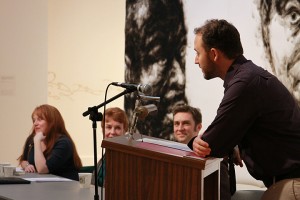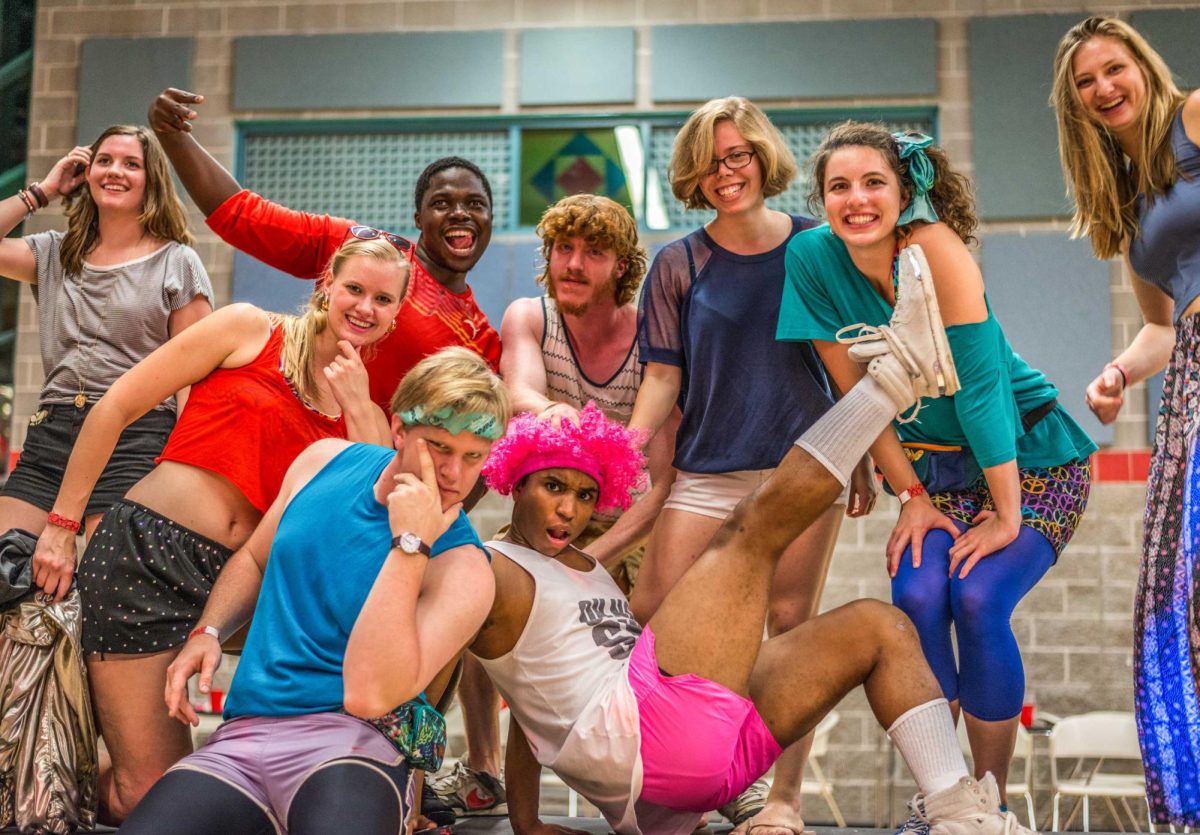The professor of “Peace and How to Achieve It” is back. At least he was for a brief period this week, during which David Western, Assistant Professor of Humanities and Political Thought at Valparaiso University, reconnected with former students, faculty and engaged in a discussion on Wednesday night in which he, Professors Dobe, French and Delmenico all spoke on their perspectives on achieving peace and how their respective fields of expertise may be applied to the continuing conversation.

Western began his presentation by relaying a story in which a questioning individual confronted a Hindu Swami who was presenting on the topic of peace himself. Western said that through his research he sees two different schools of thought when it comes to peace studies.
“The questioning man wants to find a plan or a means for eradicating the problems of the world and arranging the structures of our lives to suit a preordained sense of what a just society ought to look like. The second—the swami—seems to be suggesting that life is inherently more messy than that, that the human condition is one of trials and tribulations…” Western said.
Western asserted that the construction of peace needs to be both an emotional and empathetic endeavor but must also be coupled with a more formulaic approach that may look something like an engineering project.
“Just like we ask, ‘What materials do I need to build this bridge,’ or some other construction project, so do we ask, ‘What institutions of structures are best for constructing social conditions for peace,’” Western said.
Much of Western’s work focuses on finding patterns of peace building in post-conflict Northern Ireland and he spoke about how, while peace may be highly studied, deconstructed and explained, the people doing this activities are not the ones deciding current international peace moves, or the ones supply dictators or rebel armies with semiautomatic weapons.
“I think Johan Galtung… is pretty much the great grandfather of peace studies,” Western said. “Galtung takes a three-prong approach and says peace is the absence of there kinds of violence: direct violence, which is violence from overt physical harm; structural violence, which is political economic and social oppression; and cultural violence which is cultural norms that legitimate or encourage direct or structural violence.”
However, as Western explained, people like Galtung do not necessarily call the shots and the often the most effective way to help put peace into action is by getting close to the big players, such as the United Nations and the United States government. Despite their obvious concentration on peace building, Western mentioned that the closer one looks at entities such as the UN and US government, the more one comes to realize that the main emphasis of their work is to transform troubled, post conflict societies to resemble western nation states.
In Northern Ireland, the factors that led to such a violent and divided population are complex, but certain observations about their violence have allowed for the development of an especially grass-roots model of post conflict peace building. On the one hand, the conflict was about the governance of Northern Ireland. Catholic republicans sought to have Northern Ireland incorporated into the greater republic of Ireland. Many Catholics saw the presence of Protestants as the remnants of colonialism.
“The conflict in Northern Ireland was simply a clash between two identity groups living side by side that had developed norms and identities that defined each other as enemies, and not as groups that can work together to fashion a common, collective fate,” Western said.
Western explained that one of the first steps of peace building in Northern Ireland was for Catholic republicans to accept that their culture can survive within a British Northern Ireland and that the British culture that Protestants live by is not necessarily an essential threat to their existence. The process followed a similar pattern for the ‘British’ citizens of Northern Ireland, the Protestant Unionists.
In Northern Ireland, members of the Catholic community who have been to jail are often idealized by a militant culture of male youths. Western said that one of the greatest leaps in the peace making process was when these ex-urban soldiers began to organize on the streets for unity and to foster non-violent discourse between Catholics and Protestants. By identifying with a hero who was now showing the power in meeting with “the enemy” and taking a stand against violence, these leaders are showing that it is possible for a few members of one generation to cultivate the next generation for a cause of non-violence.
“In motions such as these, the Northern Irish have been moving away from norms and identities that encourage violence to norms and have been, thought creativity and courage, reshaping their own identities and norms to encourage more peaceful cohabitation,” Western said.
Western concluded his presentation by contending that the real process of making peace is to bring in as many collective negotiating tools and models as possible.
“…If we want peace in the world we must also be negotiating our identities, our relations with others, what meaning and worth we ascribe our beliefs and those of others—and we must always be choosing identities and norms of peace, cooperation and, I am going to say, caring or learning to care for others as well,” he said.


















































